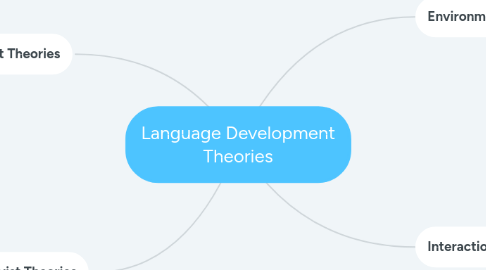Language Development Theories
by Robert Mclean

1. Nativist Theories
1.1. Proponents argue that much of what the child needs for learning language is built in. Researchers have established that very young infants focus on individual sounds and syllables in the stream of sounds they hear, that they pay attention to sound rhythm, and that they prefer speech of a particular pattern
1.2. Infants have an inborn mechanism for acquiring syntax knowledge in any culture and society, also known as universal grammar.
2. Constructivist Theories
2.1. Similar to the nativist theory, some theorists argue that what is important is not the built-in biases or operating principles but the child’s construction of language as part of the broader process of cognitive development.
2.2. Though, in contrast to the nativist theory, the cognitive developmental theory does not state a specific inborn mechanism as part of the developmental process.
3. Environmental Theories
3.1. Imitation- has to play some role. A child learns the language he/she hears. The relationship between imitation and language learning is of both theoretical and clinical interest. While current some experts give imitation only a limited role in language learning, learning theorists and others continue to refer to imitation as a major factor in the child’s acquisition of language.
3.2. Behaviorist-In contrast to the nativist the behaviorist perspective believes that nurture is most crucial in the process of language development. According to B. F. Skinner's behaviorist, infants learn to associate certain stimuli with certain behaviors and responses. With continued reinforcement, infants learn appropriate
4. Interactionist
4.1. Similar to the behaviorist theory, the interactionist theory believes that nurture is crucial in the process of language development. Though, the interactionist perspective differs from the behaviorist perspective in that this perspective believes that language is acquired through social interaction in the environment, not reinforcement.


